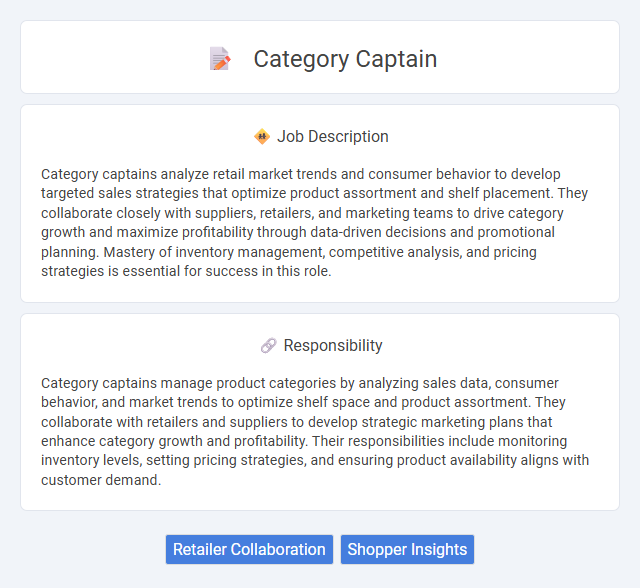
Category captains analyze retail market trends and consumer behavior to develop targeted sales strategies that optimize product assortment and shelf placement. They collaborate closely with suppliers, retailers, and marketing teams to drive category growth and maximize profitability through data-driven decisions and promotional planning. Mastery of inventory management, competitive analysis, and pricing strategies is essential for success in this role.
People with strong analytical skills, attention to detail, and the ability to influence others will likely be suitable for a Category Captain role. Those comfortable working under pressure and managing multiple stakeholders may find this position aligns well with their strengths. Candidates lacking these traits might struggle to meet the demands of the job effectively.
Qualification
A Category Captain must possess strong analytical skills and expertise in market research to effectively analyze sales data and consumer trends. Proficiency in inventory management, merchandising strategies, and negotiation is essential for managing supplier relationships and optimizing category performance. A background in business, marketing, or retail management combined with excellent communication and leadership abilities is crucial for driving category growth and collaboration across teams.
Responsibility
Category captains manage product categories by analyzing sales data, consumer behavior, and market trends to optimize shelf space and product assortment. They collaborate with retailers and suppliers to develop strategic marketing plans that enhance category growth and profitability. Their responsibilities include monitoring inventory levels, setting pricing strategies, and ensuring product availability aligns with customer demand.
Benefit
A category captain job likely offers significant benefits such as access to valuable market insights and the opportunity to influence product placement and promotions. There is a strong chance this role enhances collaboration with retailers, leading to improved sales performance and brand visibility. Employers may also provide competitive compensation and professional development opportunities tied to this strategic position.
Challenge
Category captain roles may present significant challenges due to the need to balance competing interests between retailers and manufacturers while driving category growth. Navigating complex data analysis and market trends likely requires strong strategic thinking and problem-solving skills. The responsibility to maintain collaborative relationships amid high accountability often demands adaptable communication and negotiation abilities.
Career Advancement
A Category Captain plays a critical role in retail by driving category growth through data-driven strategies and supplier collaboration, positioning themselves as key influencers within the industry. Mastery in market analysis, consumer behavior insights, and supply chain optimization enhances career advancement opportunities to senior management or strategic roles. Developing strong leadership and negotiation skills further propels progression toward director-level positions overseeing broader business units.
Key Terms
Retailer Collaboration
Category captains drive retailer collaboration by analyzing sales data to optimize product assortment and shelf placement, enhancing overall category performance. They facilitate strategic partnerships between manufacturers and retailers, aligning marketing efforts and promotions for increased consumer engagement. Their expertise in consumer behavior and market trends enables seamless coordination that boosts sales and profitability for both parties.
Shopper Insights
Category captains harness shopper insights to develop targeted strategies that drive product placement, pricing, and promotions. By analyzing consumer behavior data, purchase patterns, and market trends, they optimize category performance and enhance shopper engagement. Their expertise in shopper insights enables brands to anticipate customer needs and increase sales efficiency.
 kuljobs.com
kuljobs.com